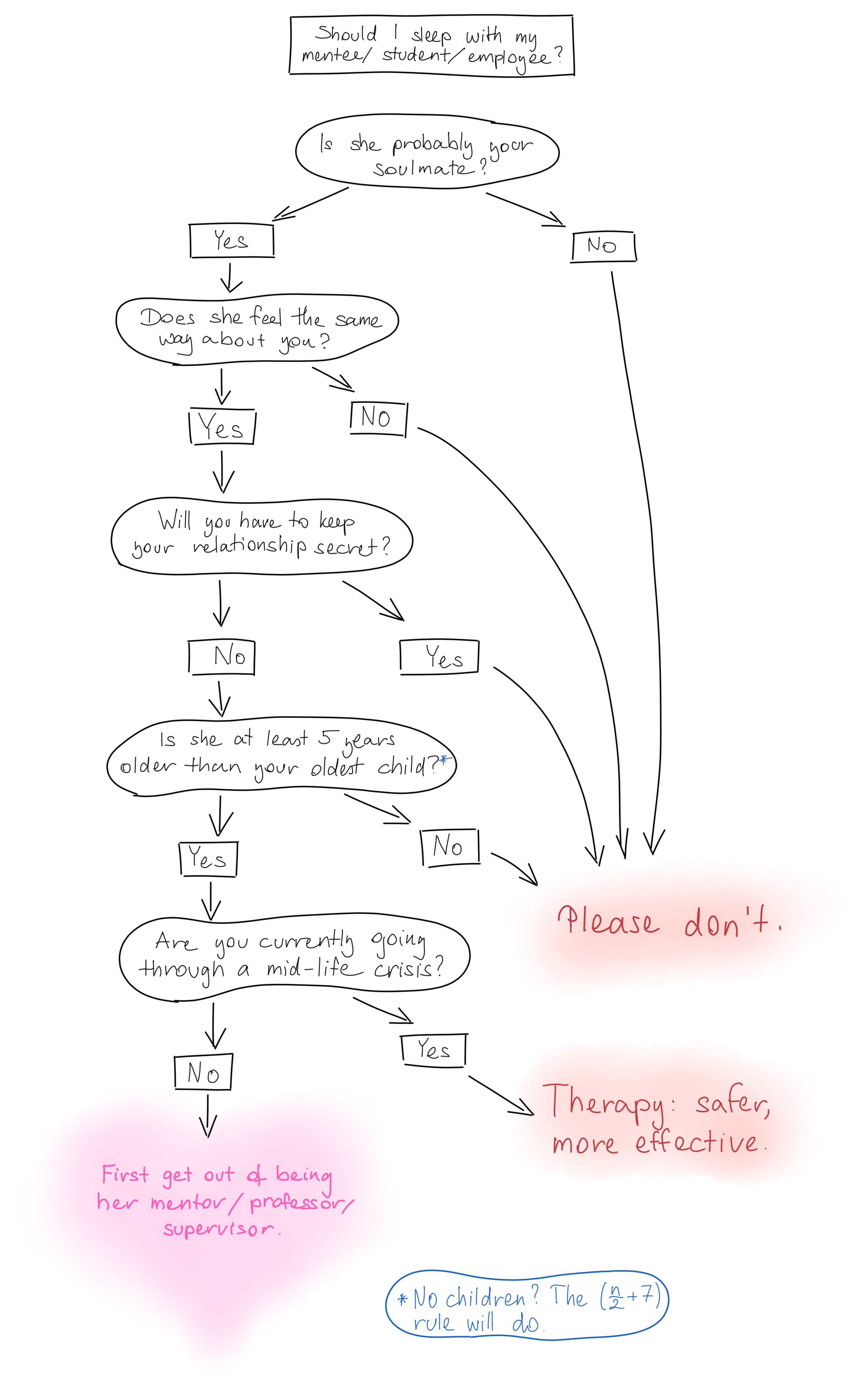I apologise for referring to the junior person as “she” throughout this post, and assuming that the senior one is a “he”. I know this is only one of many possible situations, and much of what I say applies to any of the others too. This is going to be a complicated post, so I summarised my recommendations in a handy flow chart for easy use:
 I’ve just solved all work-sex-related questions of the world, eh? I’ll still include the analysis, lest you assume I’m advocating chastity. Not to worry, I’m ok with you all sleeping with non-soulmates most of the time! (Must be a relief to know that.)
I’ve just solved all work-sex-related questions of the world, eh? I’ll still include the analysis, lest you assume I’m advocating chastity. Not to worry, I’m ok with you all sleeping with non-soulmates most of the time! (Must be a relief to know that.)
Let’s begin with the mutual soulmates, because that risk-benefit comparison is so hard it’s almost easy. The benefit is being with someone you love. That is a big benefit, and I’m a romantic when push comes to shove. I’d also be a hypocrite to unilaterally disapprove of these relationships: I’ve done it three times myself, as the junior half. Granted, two were train wrecks. The third I married, and even though we eventually split up, it was a rich relationship with many beautiful moments.
But what about the risks? If you, the older person, are settled in your career and she is not, you might have to move for her or she might have to make compromises on job prospects. If the relationship doesn’t work out, you might still be part of the same professional circles. When she applies for a job, submits a paper, or is nominated for an award, the people who must evaluate her work might have a hard time seeing her as an entity in her own right, rather than your partner.
In addition, the younger she is, the more likely she will find it difficult to develop her own professional identity while attached to you. This was me, while married to my ex-husband, only seven years older than me: he was a rising star when I began dating him, successful, well-respected, confident. In retrospect I think he struggled with insecurities as much as the next person, but from my younger perspective he seemed omnipotent and self-assured. I couldn’t stop comparing myself to him.
All of these risks can be mitigated with awareness and sensitivity. I only ask that you avoid three red flags: secrecy, enormous age difference, and midlife crises. That is, if, in the middle of a midlife crisis, you become convinced that a student in your class is your soulmate, but you’re monogamously coupled and play out your fantasy as a secret affair behind your office door… that’s unlikely to end well. “I couldn’t get out of marking her exam because then my wife might have found out… but it’s ok, she aced all the questions!” Sure, there are December-May romances that work out well, but in a professional setting the big age difference comes with a big power difference, and, in my opinion, that gets too risky.
Had I watched out for the three red flags, I would have avoided the train wrecks, but I would still have married my ex-husband. If you’re on this journey, be aware that building a partnership of peers from an unequal starting point can be difficult, and the bigger the power imbalance, the harder it is. Please get out of any formal position of power over her immediately. Your informal power will be plenty for the two of you to grapple with for years to come.
Moving on to non-soulmates: you’re not expecting a serious relationship, just one or a few fun occasions. I will assume that both (or all) of the people involved are single or otherwise available: in other words, I’ll ignore the risks involved in breaking the trust of a committed relationship, because these are not specific to work affairs, or to the older or the younger person.
So you are an established professor/ supervisor, and you have been subtly flirting with your sexy young colleague/ mentee/ student (who graduated yesterday), and she seems receptive. She actively flirts back. Maybe she was the one who started it. Should you lift her right onto your office desk? (Those ergonomic height-adjustable ones are handy…) I say nope – un-fun chaste answer, but hear me out.
Benefits — same for both:
- Good sex can be quite enjoyable!
- You may get an ego boost: a {young, beautiful} / {accomplished, powerful} person is attracted to you.
- There can be a thrill in doing something risque.
Risks for you:
- “Can you do my post-doc’s yearly review because I’d like to sleep with her” doesn’t sound as classy as “can you do her yearly review because we’d like to date”. So you might just skip the conversation, performance reviews are a formality anyway, right? Later, you may be “found out” at work, and eyebrows might be raised. The more power you have over her, the worse this gets: if she is a student in your class there might be professional consequences.
- You might unexpectedly fall in love with her – that can lead to problems if she doesn’t feel the same way. However, many years of life experience can help you assess this risk. You also may have been socialised to separate sexuality from love, lowering the risk further. (My first boyfriend Percival’s father gave him the sage advice “Don’t worry son, it won’t wear out!” Percival sure seemed to take this advice to heart.)
Risks for her:
- She may be “found out” at work, and lose the respect of her colleagues or be seen as someone “sleeping her way through” her career. Society’s tropes are nasty: it is difficult to objectively evaluate a situation that fits into a trope. If she is just starting out in her career, this can hurt her chances of getting a job or a place in a graduate program, especially so if you would have been a potential reference.
- Despite the clearest setting of expectations, your carefree, easy-going playmate might fall in love with you. This can lead to a dreadful mess, even more so if you had planned to continue your professional relationship. The risk is higher if she was taught to equate sexuality with love, like yours truly. As a self-respecting millenial (Gen-Z??) she might not openly admit to such old-fashioned views, but socialisation is hard to shake.
- She is at the beginning of figuring out her professional, personal and sexual identity, and having a work affair with a senior person messes with all of that. She will never be sure whether you chose to mentor her or gave her an A because of her skills or because of her looks. Sex should be a partnership where the participants negotiate (verbally or otherwise) on equal terms; instead she sees you as an authority figure and might put pleasing you ahead of her own wishes or even safety. She is working on finding her professional self worth and confidence, and sexual success at work is not a healthy source.
The more power you have over her, the more severe this risk: a PhD supervisor is perhaps worst, a senior collaborator is less damaging, an older colleague who does different research is even less so. - Her thrill is likely mixed with a dash of dangerous shame, which means she may not be willing to ask for help if things go south. There’s nothing like shame and secrecy to feed into dormant mental illness, self harm, or worse.
Being an exhausted mom – and looking the part – has advantages. These days, I can host my colleagues at my house for dinner, I can joke with them, even hug them, cuddle their babies, I can be myself. I’m no longer being chased around offices, none of my collaborators are in love with me or vice versa, and that subtle innuendo has drained from the way men at work interact with me. It’s liberating. I can be a warm person, and still, remain just a person.
I wonder what my part has been in making this possible: Acting more mature? Acting more confident? Dressing more conservatively? Being settled with Pink? Having a kid? Looking like I have a kid? But really, it doesn’t matter: I could not have looked or acted like my older self when I was my younger self. I didn’t have the resources, the experience, the very identity.
When I started out in this career, I had blind faith that anything that *really* should not happen will not happen. So, anything that does happen must therefore be ok: in mathematics we call this reasoning the counter-positive. I trusted the laws of professional ethics to protect us all from harm as if they were the laws of logic or physics; and I did so because I respected established academics as demigods. Had I known that we were just people, I might have exercised more caution, but maybe I was too immature for caution altogether.
Now that I’m blissfully sidelined, looking back at the playing field makes me cringe. I know the senior players mean no harm. I know the juniors are into it. But older people, please consider her risks versus yours. Please don’t sleep with your (barely finished) students, post-docs, and young collaborators. Be the grown-up.
If you want the thrill of an encounter with a sexy young person, why not seek that out elsewhere, wherever young people hang out… um… Bars? The internet? Yoga class? That will be harder, because you won’t automatically be seen as a sexy, powerful figure: you’ll have to establish that sex appeal first. But it will be worth it. Please rise to the challenge, friends.
I’m curious if this will be a lively comment section.

Surprisingly few comments. Surely not because of the flow chart – that is ingenious:)